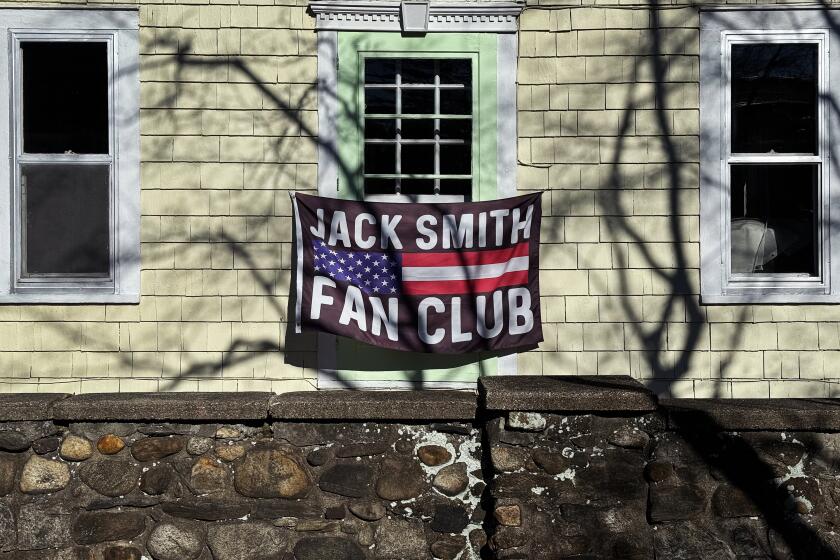An Unbalanced Picture of War in Black, White
For those of us who esteem the life and memory of the late Dr. Martin Luther King Jr., last Monday was perhaps the most sobering of the national holidays yet observed in his honor. Wherever one looked or went, anxiety rippled and whispered like a powerful current in deep water:
White America’s war in the Persian Gulf is peaking; black America’s war is soon to begin.
By now, most of us who have followed the news of the war against Iraq know that the number of black men and women sent to fight Saddam Hussein is greatly disproportionate to their general-population percentage of barely 12%. Slightly more than 20% of all members of our active armed forces are African Americans, according to the Congressional Research Service. Nearly one in three soldiers, one in five Marines, more than 15% of the Navy and the Air Force is black.
Those numbers conceal a stark fact: Barely 7% of all commissioned officers are African Americans. Thus far, the campaign in the Gulf has been an air war, waged almost entirely by commissioned pilots and, to a large extent, by an Air Force that is 77.9% white. Blacks are overwhelmingly clustered in the noncommissioned and enlisted ranks, particularly in the elite fighting units that will bear the brunt of the ground assault to dislodge Saddam Hussein from Kuwait.
At the end of the first week in their war, no one will count American casualties on the fingers of two hands.
That, I think, accounts in some measure for the dramatic difference between black and white attitudes toward the war. Polls show that while eight of every 10 white Americans support the attack on Iraq, only 47% of blacks do.
But unless one believes that the people who waged a great social revolution to overthrow Jim Crow suddenly have lost their taste for sacrifice, something else must be at work here. That something, I suspect, also explains the other curious aspect of this week’s memorials to Dr. King. The holiday we observe in his name also has become an occasion on which to acknowledge black progress. Yet it was striking how little notice was taken of the central role now being played by Gen. Colin L. Powell, America’s first black chairman of the Joint Chiefs of Staff.
A little more than a generation ago, the United States went to war with a totally segregated military. Today, those forces are not only integrated, but also commanded by an African American. The scant notice taken of that fact on a holiday of such importance to black America is a striking departure from a tradition common to all ethnic Americans.
When, for example, I was a parochial schoolboy in salt-and-pepper corduroy and a starched white shirt, my classmates and I frequently were regaled by the nuns and priests with stories of “successful” American Catholics. They were to be our models of civic achievement, as the saints were our models of heroic virtue.
That was in the 1950s, a few years before John F. Kennedy’s election signaled American Catholicism’s political emancipation, and, even then, I sometimes felt that my teachers were ransacking history to demonstrate our co-religionists’ contribution to the common good.
My particular favorite was the story of Charles Carroll of Carrolton, who was, we proudly were told, “the only Catholic to sign the Declaration of Independence.” Carroll, as the story went, had just affixed his name to the document, when one of the bystanders joked that he, at least, would be safe from British reprisal, since there were several Charles Carrolls in the colonies. Without hesitating, Carroll added “of Carrolton.”
It makes no difference that I since have learned that Carroll lived on to a great old age, an amiable but unbending reactionary, who defended chattel slavery and aristocratic privilege and opposed every good and decent political impulse that raised its head from Jefferson to Jackson. I still cannot look at a facsimile of the Declaration of Independence without searching out his signature, and without thinking of the nun who first told me that story. I see her watery blue eyes suddenly shining from within her wimple; I see her fierce, long index finger raised like a standard: “Here, boys and girls,” she seemed to say, “here is something to live up to.”
At the end of the day, stories such as hers make for more than endearing memories. The childish pleasure we take in them is the first stirring of those private values we later carry into public life. In a deep sense, the act of memory is, as Aquinas argued, a branch of ethics.
Some day, an African-American journalist will write a column such as this, one in which he or she recalls that, as a child, he or she learned of Gen. Colin Powell and how he won a great victory over the tyrant Saddam Hussein. That writer also may recall how he or she later discovered that Gen. Powell went to war under orders of a Commander-in-Chief who gained the White House, in part, because he exploited white suspicions that all black men are criminals.
That writer may remember how the Commander-in-Chief was the first President ever to veto a civil rights bill, of how he personally campaigned for a lawmaker named Jesse Helms, who retained his seat in the U.S. Senate by inciting white working people against blacks.
That writer may muse on how Gen. Powell led thousands of young African Americans in the service of a nation that imprisoned black men at four times the rate of South Africa. He or she may reflect on how polls show that 78% of that country’s white majority believed blacks prefer living on welfare to working; on how 56% of them believed blacks were more prone to violence than whites; on how 53% thought blacks were less intelligent than whites; on how more than half that majority even thought blacks were less patriotic than whites.
That African-American writer may want to overlook all that and simply celebrate the honorable and thoroughly admirable individual role Gen. Powell played at a perilous moment in this nation’s history. But, somehow, that seems like a lot to ask.
More to Read
Get the L.A. Times Politics newsletter
Deeply reported insights into legislation, politics and policy from Sacramento, Washington and beyond. In your inbox three times per week.
You may occasionally receive promotional content from the Los Angeles Times.










